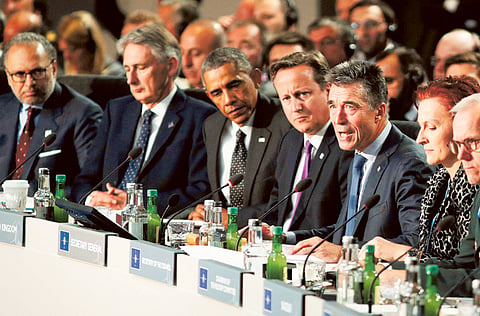Nato summit opens as US, Britain rally allies
Ukraine crisis tops the agenda of two-day meeting

Newport, United Kingdom
A Nato summit billed as the most important since the Cold War got underway on Thursday with calls to stand up to Russia over Ukraine and confront Islamic State of Iraq and the Levant (Isil) extremists.
The Ukraine crisis tops the agenda but the 28 leaders must also tackle new threats posed by Isil in Iraq and Syria, and oversee a problematic withdrawal from Afghanistan.
“To the east, Russia is attacking Ukraine,” Nato secretary general Anders Fogh Rasmussen said as he arrived for the two-day meeting held amid heavy security in Newport in Britain.
“To the southeast we see the rise of a terrorist organisation, the so-called Islamic State,” Rasmussen said, adding: “We will take important steps to counter these threats.”
US President Barack Obama and British Prime Minister David Cameron warned their allies not to shirk the challenge.
Vowing to “confront” Islamist radicals in Iraq and Syria, they said they would not be “cowed” following the beheading of two US journalists.
They were equally trenchant over Ukraine.
“Russia has ripped up the rule book (with) ... its illegal annexation of Crimea and its troops on Ukrainian soil threatening and undermining a sovereign nation state,” they said in a joint editorial in The Times newspaper.
In response, they said Nato — set up in 1949 to defend Western Europe against the Soviet Union — should support Ukraine’s right to choose its own future and build a “persistent” presence in Eastern Europe to reassure nervous allies.
In a high-profile gesture of support, Cameron met Ukrainian President Petro Poroshenko with his peers from France, Germany, Italy and the United States.
Poroshenko will also attend later on Thursday the Nato-Ukraine Comission, set up after the country became an alliance partner in 1997 to manage relations.
In Ukraine meanwhile, Kiev reported continued “active combat operations” in the east, with “more than 100 militants” killed, while in Donetsk, the centre of pro-Russian rebel resistance, local authorities said the situation was tense after heavy shelling.
But AFP reporters said the situation on the ground looked quieter than in recent days including in the rebel hub of Donetsk and the city of Ilovaysk which has been surrounded by pro-Russian rebels.
In a clear effort to seize the initiative and the headlines, Russian President Vladimir Putin unveiled a peace plan on Wednesday which he said would produce a ceasefire on Friday, the same day the European Union is expected to announce additional economic sanctions against Moscow.
Rasmussen was sceptical about the proposal.
“Let me stress we welcome all efforts to find a peaceful solution ... (but) what counts is what is actually happening on the ground,” he said.
“We continue to call on Russia to pull back its troops from Ukrainian borders, stop the flow of weapons and fighters into Ukraine, stop the support for armed militants in Ukraine and engage in a constructive political process.
“That would be a genuine effort to facilitate a peaceful solution,” he said.
Rasmussen has warned repeatedly that Russian intervention in Ukraine is the most serious security threat to Europe since the Cold War.
A new rapid response force to be approved at the summit will mean there will be “a more visible Nato presence in the East for as long as required,” he said earlier this week.
Crucially, the new force will be rotated through eastern Europe, not based there permanently, to remain in compliance with a key clause in the 1997 Nato-Russia Founding Act which defined Europe’s post-Cold War borders and prohibited the use of force to change them.
On that count, Nato says Russia’s March annexation of Crimea territory is in clear violation of the Founding Act, stoking speculation the treaty could be revoked.
Nato offered Ukraine membership in 2008, when Russia went to war against another former Soviet state, Georgia, but in 2010 the then pro-Moscow president Viktor Yanukovich opted for a “non-bloc” policy.
Ukraine’s Prime Minister Arseniy Yatsenyuk has said, however, he will ask parliament to endorse a membership bid, a move bitterly opposed by Russia which resents Nato’s presence in the former Soviet states of eastern Europe.
“This is an obvious attempt to derail efforts to start a dialogue on ensuring national security (in Ukraine),” Russian Foreign Minister Sergei Lavrov said of his comments in Russian news agency reports Thursday.
The Ukraine crisis is putting the alliance under other strains.
On Wednesday, a French diplomatic source said that Paris had suspended delivery of the first of two warships to Russia in response to “pressure” from its allies who believe the sale sends completely the wrong signal to Moscow.
Nato meanwhile faces another quandary in Afghanistan, where the alliance is due to end its longest ever combat operation this year, but finds it has no government to hand over to as presidential elections have failed to produce a winner.
Rasmussen warned that time was running out for a solution, raising doubts about Nato’s planned post-2014 training mission after it formally concludes its longest ever war this year.



